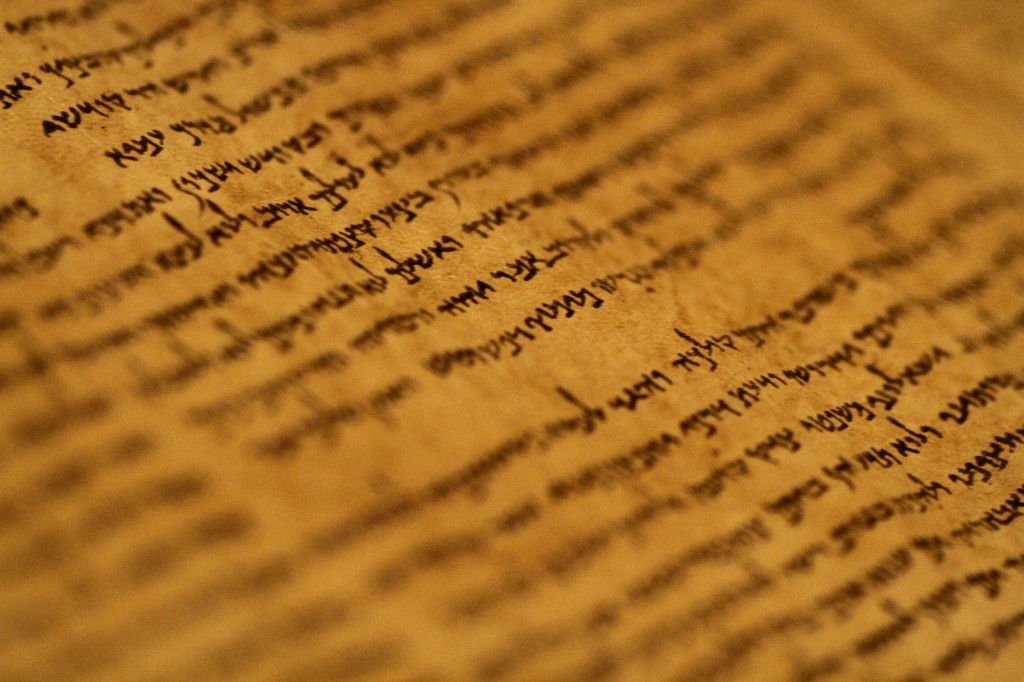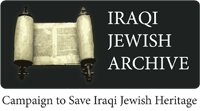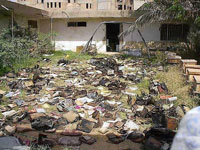The Issue
Shortly after the 2003 invasion of Iraq, US soldiers rescued an invaluable archive of private and communal artifacts, Holy Scriptures, rare books and communal records relating to one of the most ancient Jewish communities in the world. This collection, which has become known as the “Iraqi Jewish Archive”, is an illustrated history of Iraqi Jewish patrimony, a 2,500 year-old uprooted community now scattered around the globe.
The materials were badly damaged by water but were retrieved and brought to the US for restoration and preservation, with the caveat that they ultimately be returned to Iraq. The US is planning to return the Archive to Iraqi authorities, after June 2014.
Now, some 10 years after its importation to the United States, and $3 million dollars of restoration funds provided by the US Government, the Iraqi Jewish archive is contested cultural property. Iraqi/Jewish communal organizations as well as Iraqi government officials are both staking opposing claims to these artifacts and records.
Overall Goals
a) To educate public opinion that the ‘Iraqi Jewish Archives’ collection is the patrimony of Iraqi Jewry; and
b) To ensure that these expropriated materials are returned to their rightful Jewish owners
Background
On May 6, 2003, just days after the Coalition forces took over Baghdad, 16 American soldiers, entered the flooded building of Saddam Hussein’s Intelligence agency the Mukhabarat. In the basement, under four feet of water, they found tens of thousands of books, artifacts and documents belonging to the Jewish community of Iraq – materials that had been seized from synagogues, schools and other and Jewish institutions.
With limited treatment options in Baghdad, and with the agreement of the-then Iraqi Ministry of Culture, the materials were shipped to the United States for restoration and preservation. Since then, these materials have been freeze-dried, preserved and are being digitized under the custodianship of the National Archives and Records Administration (NARA). (For a first-hand account by someone who was instrumental in saving these archives, see article by Harold Rhode.
The removal of these Jewish archives from Iraq was executed under the Immunities from Seizure Act, a law which allowed the conservation measures to take place while protecting the archives from possible seizure by claimants to both Iraqi assets and Jewish heritage.
Although there is no Jewish community remaining in Iraq, under this Agreement, the US State Department is to ship the entire collection back to Iraq after two exhibitions of select documents in Washington DC and New York City.
The Iraqi Jewish Community
Iraq is the modern designation for the country carved out of ancient Babylonia, Assyria, and the southern part of Turkey after World War I. It is also the place of the oldest Jewish Diaspora and the one with the longest continuous history, from 721 BCE to 2003 CE, a time span of over 2,700 years.
During this span, there were extended periods of time when Iraq’s Jews lived in relative peace among their countrymen. In recent history, under British rule, which began in 1917, Jews fared well economically, but this situation ended when Iraq gained independence in 1932.
Thereafter, periods of persecution – including state-sanctioned, legislative decrees enacted to deprive Jews of their human and civil rights – made life for Iraqi Jewry untenable. Mass displacement began in 1949. Today, it is reported that only five elderly Jews remain in Iraq. The longstanding, vibrant Jewish community of Iraq is now extinct, save for artifacts and archives which preserve this rich, cultural patrimony.
The Collection
A Torah scroll fragment from Genesis – one of the 48 Torah scroll fragments found; A bible with commentaries published in Venice by Giovanni di Gara in 1568; Abraham Brudo’s Birkat Avraham, which was published in Venice in 1696; a 1793 Babylonian Talmud from Vienna; a Megillat Esther of uncertain date; A Zohar from 1815 – a text for the mystical and spiritual Jewish movement known as “Kabbalah”; a 1902 Haggadah published in Baghdad and edited by the chief rabbi of Baghdad; a copy of Pirkei Avot, or Ethics of the Fathers, published in Livorno, Italy in 1928 with commentary written with Hebrew letters but in Baghdadi-Judeo Arabic; a luach (A lunar calendar in both Hebrew and Arabic from the Jewish year 5732 (1972-1973) – one of the last examples of Hebrew printed items produced in Baghdad; a printed collection of sermons by a rabbi made in Germany in 1692; thousands of books printed in Vienna, Livorno, Jerusalem, Izmir, and Vilna; lists of male Jewish Iraqi citizens; records and materials from Jewish schools in Baghdad, including exam grades, financial records, applications for university admissions and other documents.
Talking Points
- We are grateful for the role played by the United States Government, the State Department and the National Archives and Records Administration. Without their intervention, there is no doubt that the Iraqi Jewish archive collection would have been lost. Their efforts rescued this endangered collection, and restored and preserved these Iraqi Jewish archives for future generationsContents within the archive, including items to be displayed in the National Archives and Registration Administration exhibit, was expropriated from private homes, schools and synagogues. It is the cultural property of the Iraqi-Jewish community.
- The Agreement to return the Jewish archives to Iraq in 2014 was based on a flawed premise – that the collection constitutes ‘Iraqi national heritage’. In fact, it is the heritage and patrimony of the long and proud Jewish community that was ultimately displaced from Iraq.
- Contents within the archive, including items to be displayed in the National Archives and Registration Administration exhibit, was expropriated from private homes, schools and synagogues. It was never the property of the Iraqi GovernmentThe Jewish community in Iraq is virtually extinct. Jews of Iraqi origin and their descendants now live outside Iraq in Israel, the U.S.A, Canada, and the UK.
- The State Department Annual Human Rights Report covers compliance with the Universal Declaration of Human Rights whose Article 17 states no one (individual or community) should be deprived of their property. Therefore, State Department Human Rights Report should include ALL Article 17 violations and the United States should not enter into any agreement and withdraw from any existing agreement, like the Iraqi Jewish Archives, with a foreign state that either condones, supports or promotes any Article 17 violation by that state.
- When there were Jews in Iraq, the Iraqi government persecuted and destroyed its Jewish community. From 140,000 in the 1940s the community has dwindled to five people today. Today, Jews of Iraqi origin and their descendants live outside Iraq in Israel, the U.S.A, Canada, and the UK.
- Iraqi officials have provided assurances to the State Department, as detailed in a letter from then-Secretary of State Hillary Clinton, “their desire to preserve all aspects of the country’s history, including the important role played by Iraq’s minority communities as well as evidence of repression and persecution by the previous regime, and make that history fully accessible to the Iraqi people and the world…. This contention is ludicrous.
- In reality, Iraq has done little to preserve the remnants of Jewish history in Iraq – on the contrary. There are an estimated 3oo unprotected Torah Scrolls, endanger of deterioration, stacked on the basement floors in the Iraq Museum of Baghdad. Nothing has been done by the Iraqi government to protect these precious scrolls.
- Moreover, there are verified reports that Jewish holy sites and Tombs are being defaced and even converted into mosques. The calamitous fate of one such site – the Tomb of Ezekiel – has been widely reported on. Click the link for a youtube video the defacement of Jewish holy sites in Iraq. http://www.youtube.com/watch?v=bj1p5vB80EY
- The US government must ensure that the Iraqi archive is returned to its rightful owners. In so doing, the US will establish a precedent whereby similar Jewish archives and materials currently in other Arab countries might similarly be returned to their Jewish owners.










